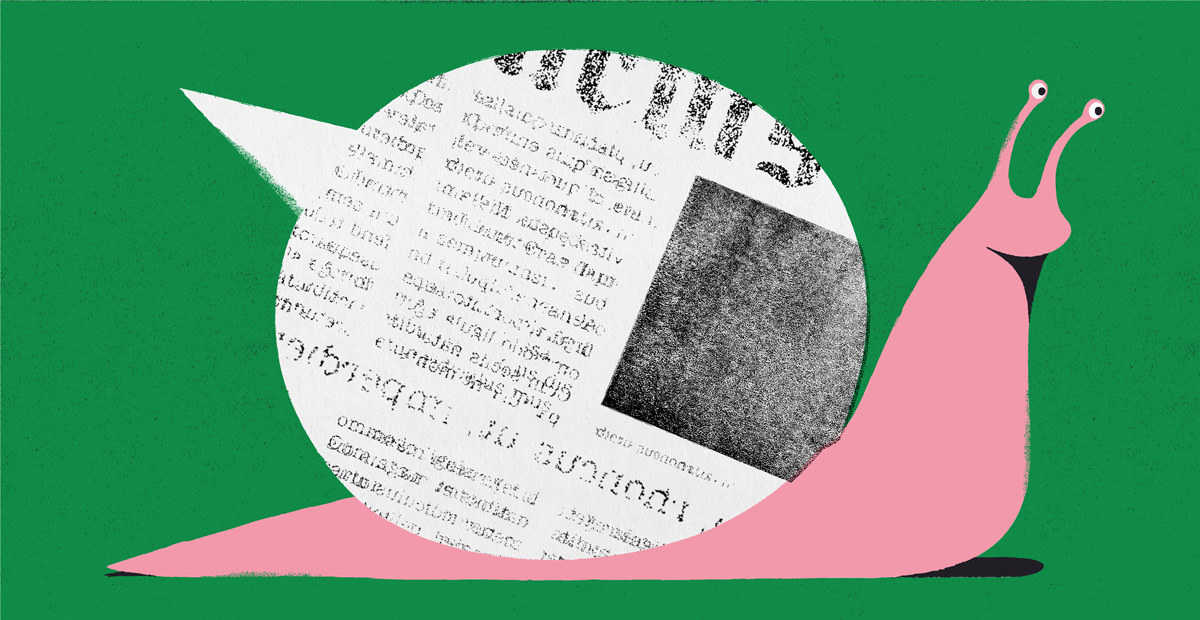
NEWS DELIVERED DIFFERENTLY
There’s always a lot going on in the world which is why we are bombarded with news updates 24/7. As media readers, viewers, and listeners we want to be informed about events and threats as soon as possible. Consequently, speed is a central part of contemporary journalism and has given rise to “fast journalism” and the thirst to be first with the latest news. But speed has morphed into a disease which has impacted the quality of journalism.
Accuracy is fundamental to good journalism, yet increasingly, it’s being sacrificed for expediency. This particularly applies to early reports of breaking news with unfolding minute-by-minute developments. To help media networks maintain rolling coverage in times of crisis, talking heads masquerading as experts are wheeled out and they invariably get essential facts wrong. One man’s expert is another man’s fool!
Flimsy or unsubstantiated reporting used as a basis for content runs counter to the long-held journalistic notions of truth-seeking and serving the public interest. News is meant to be a public good, however, as news cycles move ever faster in our digital age, the pressure to release stories quicker often results in reporters publishing only basic information with little in-depth analysis.
In all walks of life, slow and right beats fast and wrong and the same holds true for journalism and news reporting. There is a growing slow news movement which operates outside the 24/7 news trap. Proponents of slow journalism take the time to get things right and turn out quality journalism, which is characterised by accuracy, depth, context, analysis, and expert opinion.
Delayed Gratification is the name of the world’s first slow journalism magazine. It promotes itself as “a quarterly publication which revisits the events of the last three months to offer in-depth, independent journalism in an increasingly frantic world”. The magazine swims against the tide in taking a stand against kneejerk reporting by providing slower but better news.
Commensurate with its tagline, “Last to breaking news,” Delayed Gratification employs the benefit of hindsight to report on events after the dust has settled and the news agenda has moved on. This enables the magazine to get to the heart of a story by soberly reflecting on what’s happened and then presenting a long-form story in its proper context.
Another slow news organisation is Tortoise Media. It was launched in 2019 by British journalist and former Director of BBC News, James Harding. He believes that “too many newsrooms chase the news but miss the story” and that we need to “slow down and wise up”. The Tortoise website states:
We don’t do breaking news, but what’s driving the news. We don’t cover every story, but reveal a few. We take the time to see the fuller picture, to make sense of the forces shaping our future, to investigate what’s unseen.
Someone else who believes that journalism needs reinvention is US journalism scholar, Professor Jennifer Rauch. In her book, Slow Media: Why ‘Slow” is Satisfying, Sustainable, and Smart, she makes the case for rethinking the way media is produced and consumed. Rauch is a fan of slow journalism as it requires reporters to spend weeks analysing the accuracy and perspectives of initial reports before publishing their own reports.
In an interview following the release of her book, Rauch stated that many journalists aren’t getting to do the kind of in-depth, thoughtful, accurate reporting that drew them to the profession in the first place. She went on to opine that:
Much news coverage is incomplete at best, inaccurate or misleading at worst. Too many news stories are dependent on press releases or official sources. You hear a lot about people getting news fatigue and avoiding the news because it makes them feel anxious.
Long before Rauch published her book in 2018, another academic – Professor Nassim Nicholas Taleb – called out the deficiencies with modern news reporting. In his 2007 global bestseller, Black Swan: The Impact of the Highly Improbable, Taleb emboldened his readers “not to read newspapers, or follow the news in any way or form”.
The Black Swan illuminated the severe limitations of our thinking and the fragility of our knowledge*. Taleb was one of the first people to recognise news consumption as a serious problem. “The more information we absorb,” he cautioned, “the more difficult it becomes to discern the relevant from the irrelevant”. Taleb views journalism as “pure entertainment, not the search for the truth” and warned:
Remember that we are swayed by the sensational. Listening to the news on the radio every hour is far worse for you than reading a weekly magazine, because the longer interval allows information to be filtered a bit.
It is alleged that Mark Twain once asserted: “If you don’t read the newspaper, you are uninformed; if you do read the newspaper, you are misinformed”. Sadly, Twain’s quip is more relevant today than in his day and many would agree with his claim.
It’s my contention that to achieve one of journalism’s prime purposes – the creation of an informed citizenry – we should adopt the classic strategy of slow and steady wins the race by embracing slow journalism.
Slow journalism is seen as the antidote to social media’s need for speed. “If social media is a fast-food boxed meal”, says AdNews Australia, “then slow journalism is a high-quality degustation. In a world of same-day delivery, instant noodles and push notifications … it’s hardly surprising that there are some people who just want things to move a little more slowly”.
One media outlet which has embraced slow journalism is the Australian Broadcasting Commission (ABC). In 2018 the ABC launched a slow journalism initiative called the Remote Communities Project (RCP). The RCP created stories that provided audiences with an insight into life outside of metropolitan cities.
Reporters were able to work without the normal time constraints associated with fast journalism. They benefited greatly from spending up to a fortnight in the bush learning first-hand about the issues and experiences of people living in isolated areas of Australia. Free from the tyranny of the 24-hour news cycle, reporters were able to uncover “the untold stories”.
■ ■ ■
Since my retirement from full-time work in mid-2019, I have naturally gravitated toward longer-form, slow journalism and feel much better informed. The journals and magazines that I read are void of sensational and superficial storytelling but replete with investigative and factual journalism. The well-rounded and balanced articles which are delivered direct to my inbox are a joy to read.
While fast media feeds us small bites of trivial matter, slow media delivers big chunks of meaningful matter with the latter content designed for those who take their news seriously and think deeply about the issues behind it.
Elephant in the Room is an example of slow media as each post is written after a period of reflection and research. This blog is a place for reasoned argument supported by corroborating evidence. Its contentions aim to be intellectually compelling without being academic to give you a clear understanding of the forces shaping our world.
■ ■ ■
We know from Aesop’s classic fable, The Hare and the Tortoise, that being the fastest does not guarantee victory. When this lesson is applied to journalism, it’s clear that filling the news abyss is not a sprint but a marathon. We need to recalibrate our relationship with the media and rethink how we consume information. The days of rocket-fast news ruling the media roost is being challenged by those who believe that we need to hasten slowly.
In the race of life, the tortoise ultimately beats the hare.
* Black Swans are extremely rare and unpredictable events that have massive impacts on society. These include positive Black Swans, like the phenomenal rise of Google, as well as negative Black Swans, such as the devastating 9/11 terrorist attacks.
Regards
Paul J. Thomas
Chief Executive Officer
Ductus Consulting


You know you have just opened a can of worms with me Paul.
There are so many angles to this story I feel like we should sit down for several weeks to discuss and explore it in more detail.
What do you think?